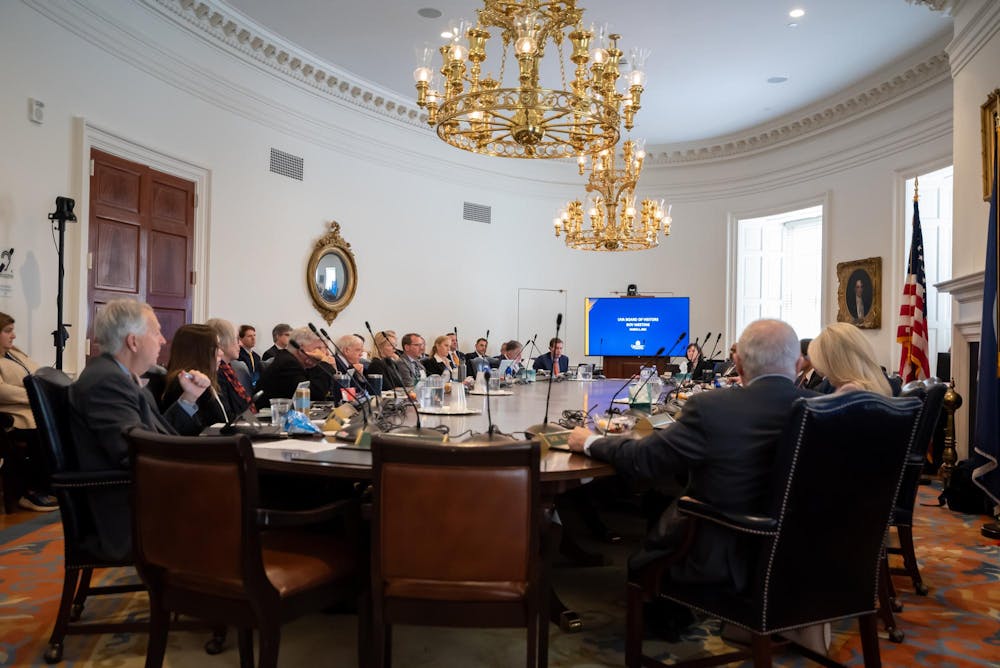Students and faculty have spoken, and their distrust is deafening. This week, the Student Council joined the Faculty Senate in passing a vote of no confidence against the Board of Visitors. These two no confidence votes should be seen as what they are — a seething reflection on the Board’s repeated failure to honor its promise of transparency and inclusion.
This broken promise has become especially apparent in the composition of the presidential search committee. Included in this group are noted names, such as Olympian alumna Gretchen Walsh, University Athletics Director Carla Williams and more members of the Board of Visitors than any other delineated group. Yet only one undergraduate student and four faculty members were listed, all of which runs contrary to requests and protestations from the Student Council and Faculty Senate for genuine inclusion. Excluding these central stakeholders removes student and faculty agency from key conversations and fundamentally endangers confidence in our governing bodies. Through their action, the Board has replaced the principle of shared governance with a form of power that is centralized in their own hands.
Perhaps this is what the Board wants. Looking at the search committee formed by the Rector of the Board, it is clear where the power of presidential selection was placed — that is, of course, with the Board. The rector and current and past Board members outnumber undergraduate students 12 to one and faculty three to one. This exclusion not only stands at odds with the interests of living stakeholders, but also contradicts the historical premise of our University — by excluding humanities professors and undermining student self-governance, the University does a disservice to the founding values of Thomas Jefferson’s Academical Village, as dismayed faculty have already noted. In all aspects of selection, this search committee conveys a sense that the only key stakeholder the Board genuinely cares about representing is themselves.
What the Board seems to have not fully grappled with, however, is the implications of this action. Undoubtedly, this centralization of power within the Board and only the Board will lessen the legitimacy of the search process in the eyes of the people who live and work at this institution. As the ones who learn and the ones who teach, students and faculty are by definition the focal points of this educational establishment. The importance of students and faculty, alongside but not fully subservient to the University administration, provides the framework for our system of shared governance around which all these stakeholders have historically coalesced.
But the dearth of students and faculty indicates that our opinion is neither wanted nor considered. Long before the search committee was announced, students and faculty noted that the committee was a moment for the Board to revitalize shared governance which many felt had been curtailed in the wake of former University President Jim Ryan’s forced resignation. But this moment was not seized — by losing any confidence that students and faculty may have had in them, the presidential search committee became tainted in a way that likely risks limiting stakeholder support for our next president. Put simply, the self-serving actions of the Board are not just harmful to students and faculty today, but they are harmful to our institution as a whole and the future president who will be invited to lead it.
Choosing a University President is possibly the most fundamental decision that this institution can make. It is, in essence, a determination as to what our future will look like, from fundraising to student outreach, faculty research funding and more. If the Board deems students and faculty stakeholders unworthy and unnecessary to such a central process, what is to stop them from acting with similar neglect for us in other matters going forward? The Board has already established their own precedent for ignoring student and faculty self-governance, and this present disregard only goes further to codifying it. It is not difficult — indeed, it is concerningly easy — to envision a future where any significant self-governing action taken by students and faculty is routinely ignored by the Board as they chart their own unilateral path forward.
In creating a committee that elevates the Board but diminishes students and faculty, the University has not just delegitimized their selection process — they have imperiled the future security of key stakeholders in our University community. In our last editorial, we asked questions that stakeholders in our community were reckoning with and advocated for transparency and inclusion. One question we asked was “What comes next?” With this presidential search committee, the Board has spoken — and the answer lies against the interests of student and faculty stakeholders at our University.
The Cavalier Daily Editorial Board is composed of the Executive Editor, the Editor-in-Chief, the two Opinion Editors, a Senior Associate and an Opinion Columnist. The board can be reached at eb@cavalierdaily.com.







